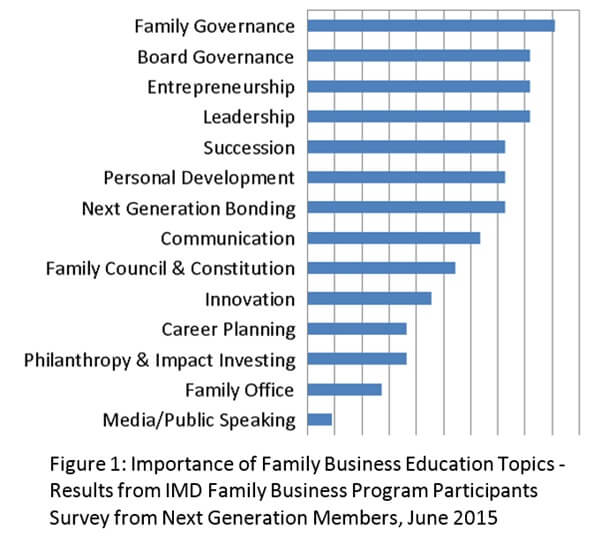
Photo by 祝 鹤槐 from Pexels
Powered by
3 things to consider as the next generation gets ready to take over the family business.
All over the world, families are looking for recipes to better prepare the next generation as potential successors for operational or board roles within the family business. Educating the next generation on family business matters is a complex matter for both senior and next-generation family members. The list of activities that help shape and prepare the next generation can be very long. Education can be a mix of mandatory, self-imposed, or discretionary activities. To ensure a successful journey, families should keep the next generation involved and learn about their needs before designing educational programs and activities.
In a recent survey, we asked next-generation family members what topics they feel they must learn about. Without hesitation, they considered family and board governance to be the most important topic of all. Entrepreneurship, leadership and succession followed closely (See figure below).

Establishing a family culture that nurtures exchange between generations is a step in the right direction, but it is not enough. Families also need to find ways to pass on their rich knowledge and heritage to the next generation while motivating them to learn about business matters. This is not a one-way-exercise. It requires commitment from both the older and younger generations.
During our 25 years of research, we have found that educating the next generation about family business matters can be one of the key ingredients to strengthen the bonds between the family and the business. This helps build a sustainable long-term vision for future generations and creates a platform for sharing experiences within the family. Having a strong education in family business matters helps the individual shape and develop a personal vision and identity as a future family business owner.
As such, there are three equally important dimensions that need to be taken into consideration whilst preparing the next generation:
THE FAMILY’S BUSINESS ACTIVITIES – Connecting with what the family business is about
While the members of every generation deserve to be introduced to the family business’s history, heritage, and values, not everybody will be naturally inclined to study business matters. Nonetheless, a general understanding about the family’s business activities with an overview of performance, innovation, marketing, finance and social responsibility, is important for all family members in order to better understand the family business’s operating environment.
It takes serious effort to design practical, interactive, and real-world learning opportunities that stimulate the interest of young people. In addition, it takes an open mind, curiosity, and commitment for them to get involved. Often, family businesses unilaterally offer activities such as internships, summer jobs, workshops with key employees, site visits, specific courses and study projects in order to get the next generation involved, but we find that they respond better when they are given a voice and the opportunity to be heard.
GENERAL FAMILY BUSINESS MATTERS – Understanding the pitfalls of family businesses
A deeper understanding of business issues will provide the younger generation with awareness of family business dynamics as well as the pressures that the owning family faces. Becoming aware of potential pitfalls and the diverse ways to approach succession, governance, and communication is a way to establish an educated discussion within the family to make the right choices. There are many different options for planting the seeds of a meaningful understanding of the family business. It requires constant but well measured watering to grow the seeds. Most families end up utilizing a mixed bag of strategies: learning from other families, enrolling in academic programs, and hiring consultants and experts.
PERSONAL DEVELOPMENT – Preparing to add value as a future owner, manager, and family member
Just as any executive can benefit from personal development and education, future family business leaders have much to gain from such initiatives. Families can provide them with tools and experiences that help shape their talents and skill set while equipping them for career success. It is important to motivate the next generation to contribute, add value, and realize the many options they have to make their dreams and aspirations come true. There are many activities that can help the next generation to assess the value that they can add to the family business. External advisers and business schools can help provide real world learning experience through teamwork and leadership training.
There certainly is no cookie cutter approach to instilling a strong sense of business into family members. Each family has to define and shape its own educational profile. Timing and location are also very important. Above all, it is the quality of education that will make all the difference. Taking next generation members out of their comfort zone, offering them hands-on experience, and providing efficient learning programs can be excellent ways to get them actively involved. Above all, the experience can be maximized when family members learn together.
Oscar Wilde once said, “You can never be overdressed or over-educated”. By applying such zeal into education, families can not only empower the next generation to actively apply that knowledge, but ultimately ensure the long-term success of the family business.
Professor Kenyon-Rouvinez co-directs The Next Generation program, which specifically prepares successors to take a leading role in any part of their family business governance system – ownership, business, family or wealth management.










